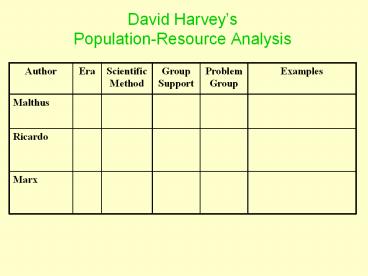David Harvey - PowerPoint PPT Presentation
1 / 14
Title:
David Harvey
Description:
The beautiful house is stacked with books, paintings, and sculpture collected ... including Bolton Abbey, the most romantic ruin in Yorkshire; Lismore Castle in ... – PowerPoint PPT presentation
Number of Views:165
Avg rating:3.0/5.0
Title: David Harvey
1
David Harveys Population-Resource Analysis
2
Malthus Population-Resource Analysis
3
Malthus Population-Resource Analysis
4
Malthus Population-Resource Analysis
11th Duke of Devonshire. The Dukes Chatsworth
manor house consists 297 rooms, 112 fireplaces,
56 loos (toilets), and 2,084 light bulbs. The
beautiful house is stacked with books, paintings,
and sculpture collected for 450 years. He also
owns another 40,000 acres, including Bolton
Abbey, the most romantic ruin in Yorkshire
Lismore Castle in Ireland a chunk of the West
End in London and a goodly extent of Eastbourne,
a shabbily genteel resort on the Sussex coast.
Unable to pay his bills in the 1950s, the duke
opened his estates to the public. By 2002,
Chatsworth was bringing in 500,000 visitors a
year and making a profit. The Chatsworth staff,
more than 600 of them, all of whom felt he had
known and respected them, put on their uniforms
and lined the road that led through the deer park
to Edensor (see photo). Source The Economist, 13
May 2004.
5
Malthus Population-Resource Analysis
6
Ricardo Population-Resource Analysis
7
Ricardo Population-Resource Analysis
8
Ricardo Population-Resource Analysis
9
Ricardo Population-Resource Analysis
From 1880s to 1930s, the shift in the worlds
economy from Western Europe to the USA resulted
in the greatest transfer of art Old Master
paintings, Chinese porcelain, furniture, altar
pieces, books, manuscripts, clocks, and carpets.
The European elites sold the USA wealthy bought.
For example, when John Pierpont Morgan died in
1913, his art collection was valued at 60
million today, it would be in the billions.
10
Marx
Population-Resource Analysis
11
Marx
Population-Resource Analysis
12
Marx
Population-Resource Analysis
13
Marx
Population-Resource Analysis
How do these three perspectives inform
population-resource relationships?
14
Alternative Population-Resource Relationships
There are too many people in the world because
the particular ends we have in view and the
materials available from nature, that we have the
will and the way to use, are not sufficient to
provide us with those things to which we are
accustomed.

